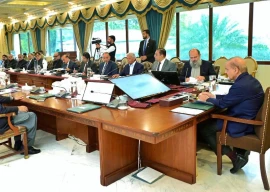
ISLAMABAD: The National Assembly on Wednesday approved a law extending the period of scrutiny of those who do not file income tax returns to the last ten years and increased customs duty on cotton many times in an apparent attempt to appease the disgruntled parliamentarians.
In the final set of amendments to the Money Bill 2016, the government also partially backtracked on its plans to interfere in the fiscal affairs of the provinces. However, it sowed the seeds of confrontation with the upper house after the National Assembly amended the Fiscal Responsibility and Debt Limitation (FRDL) Act-2005 through the Money Bill.
The government also managed to withstand the pressure exerted by big firms and disallowed tax relief in case of subsidiaries of a big group. This will adversely hit fertiliser and cement groups in the country. Also, it did not withdraw 17% tax imposed on the inputs of dairy and stationery sectors.
The government clearly hit the business interests of a Karachi-based conglomerate by changing tax laws that directly affect it, said highly-placed sources in the FBR.
Govt targets big firms with big advance tax bills
The government withdrew a condition that bounded the provinces to collect 3% advance income tax from provincial sales tax filers. However, the 3% tax remains intact that will now be collected by the federal government itself.
The federal government brought a new twist to the centre-provinces row by giving SBP-approved valuators the role to determine the value of immovable property through the Amended Finance Bill. Earlier, it had proposed to give this role to federal tax authorities. Under the Constitution, immovable property is a provincial matter.
The lower house of parliament amended Section 114 of the Income Tax Ordinance, allowing the Federal Board of Revenue to demand the details of assets and income of the last ten years from a non-filer. The existing law authorises the FBR to seek details pertaining to the last five years.
Now parliament has authorised that “In case of a person who has not filed returns for any of the last five completed tax years, notice may be issued in respect of one or more of the last ten completed tax years”.
Only one out of hundreds of offshore companies named in the Panamagate scandal fell under the five-year limit. The assembly’s decision to double the time limit will allow the FBR to investigate many dozens more of such companies, provided it gets the political support, said FBR officials.
Raw material: Tractor industry calls for cut in import duty
The National Assembly also increased customs duty on cotton from the current 3% to 11%. The move is clearly aimed at appeasing over three dozen parliamentarians from rural areas because the country was facing a shortage of the commodity due to 32% reduction in its output. The parliamentarians from rural areas had pushed the government hard to take this measure.
This step will increase the cost of production for the textile sector. The government also reduced customs duty on phthalic anhydride from 16% to 11%, providing relief to Karachi and Faisalabad-based business groups.
Moreover, the government rectified the proposed amendments in calculation of super tax.
Published in The Express Tribune, June 23rd, 2016.

































































COMMENTS
Comments are moderated and generally will be posted if they are on-topic and not abusive.
For more information, please see our Comments FAQ